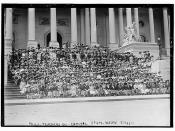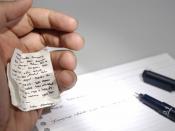The old saying "cheaters never win"ÃÂ is one that I have grown up hearing and believing. Although this idea is brought upon most of us from an early age, cheating is a largely common practice in our schools today. In order to remedy this problem, we must ask the questions, why do students cheat and what can we do to prevent cheating? There are several reasons for cheating. These come from pressures placed on students by society, home, and schools. There are also several reasons why cheating is an injustice not only to those being cheated off of, but also to those who cheat. While cheating is extremely prevalent in our schools, it can certainly be deterred and even ceased with a little effort and creative policing in classrooms. I believe that everything one learns from early childhood sets the pace for the rest of his or her life. It is important to start character education at a very early age and, as part of the curriculum, stress the importance of not cheating.
The book Everything I Need To Know I Learned In Kindergarten is a perfect example of the impressions made on us as young children. This is only a starting point. Before college, I had only one teacher in school who completely condemned cheating in her class. Without a discussion, she would drop any student who cheated from her class. Most of the other teachers in my past would either assign a zero for the work or have a student start over if he or she was caught cheating. I have to say that, throughout my entire school career, I can't recall any serious disciplinary action ever being taken against those caught cheating.
Teachers have to be monitors in a classroom and not have a lackadaisical attitude toward enforcing action against students who cheat. On test days, most teachers sit at their desks, completely absorbed in their own work. They rarely take the time to take a quick glance around the room to check for any "suspicious activity."ÃÂ Meanwhile, any student who takes the time to notice can look around and see classmates discreetly moving the hem of their shorts or sleeves up to look over the answers that they have written on their arms and legs. I have also observed the very popular hat method. This procedure is simple: just wear your hat and sit next to someone who probably studied. Make sure to line up the desks so that you have a good angle on the other person's paper. When you get to a question you don't know, put two elbows on the desk and two hands around the bill of your cap. Maintain a steady neck position and glance ever so carefully on to the paper beside you. You would be amazed at how many students start wearing hats on test days. It seems that suddenly, everyone is having a bad hair day. Surely teachers are smarter than those who are trying desperately to pull the wool over their eyes. I think that if they could, students would write things on the insides of their eyelids to help them cheat. What is so hard about asking students to roll up their sleeves, show the palms of their hands, and turn their hats backwards or remove them as they enter the classroom on test days? This seems like a rather simple solution to the problem.
Recently, I have heard about teachers having students sign a pledge of honesty to prevent cheating in their classrooms. While this is a noble concept, can we really rely on this as a method of deterring cheating? What is stopping the same students who have gotten away with being dishonest before from doing it again? Very little, I believe. In my past experiences, teachers who use reverse psychology and allow a "cheat sheet"ÃÂ to be brought in on test days have classrooms with very little cheating in them. The concept is a simple one. Students are allowed to bring in a specific size piece of paper with whatever information they can fit on it (i.e., a 3X5 note card). With the time it takes a student to make a cheat sheet, they've probably learned a considerable amount of the material. Those who don't bring their cheat sheets are put in isolated areas to complete their tests, therefore eliminating their ability to cheat.
So the story goes, a week after test day, the teacher stands in front of the class and says, "Everyone give Geralda, Julia, Clark, and Mitch a hand for being the only students to make an A on this test."ÃÂ Sadly, it is never mentioned that Geralda, the smartest kid in class, is the only one who really knew the material. This always burned me up because I was well aware that my time and effort went unnoticed while the immoral practices of others essentially got praised. I'd have to just shake my head and struggle with it for the rest of the day, content that at least I learned something.
Although I am totally against cheating, I sometimes sympathize with those who cheat. With standards rising for education, no social promotion, societal and parental pressure, and specific requirements for eligibility, college acceptance, and receipt of scholarships, I am aware of how easy a solution cheating seems. It is how many people get by in school. But what are they really getting out of their education? Certainly, very little stands to be gained by cheating. It is the principle itself that I believe in. A few years from now, will someone with fewer qualifications than me get a job that I am going after because they cheated to get there? Is it true that "cheaters never win"ÃÂ"ædo they "always get it in the end?"àIt is my ultimate belief and hope that their past eventually catches up with them and that my choice to take the moral high-road will be a rewarding one. However, I feel that by addressing this problem early, and by defining and enforcing consequences, cheating can be further discouraged and/or prevented for those in future generations.





